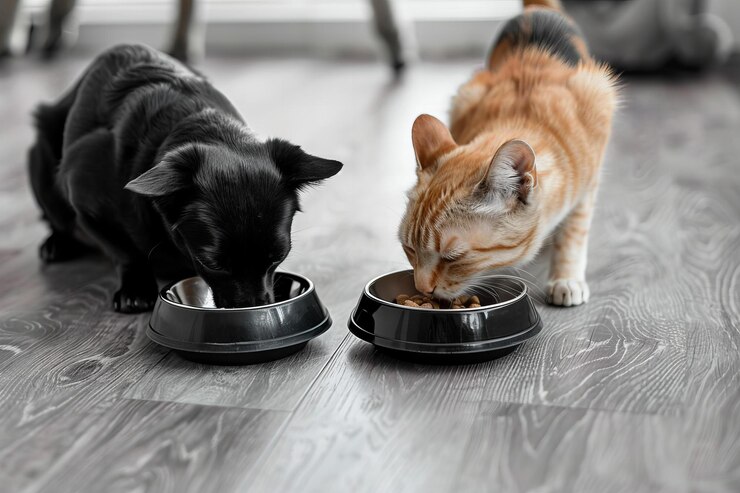A Comprehensive Guide to Keeping Your Furry Friends Healthy by introducing the Best Diet Plans for Pets:
Owning a pet comes with immense responsibility. One of the most critical aspects of caring for your furry companion is ensuring they receive a balanced, nutritious diet. Like humans, pets require specific nutrients to maintain their health and vitality. However, with numerous diet options available, it can be overwhelming to determine the best one for your pet. In this article, we will delve into some of the best diet plans for pets, taking into consideration various factors such as breed, age, and specific health needs.
Understanding Your Pet’s Nutritional Needs
Before choosing a diet plan, it’s essential to understand that pets, like humans, have unique dietary needs based on their species, age, size, and activity level. Dogs and cats, the most common pets, have different nutritional requirements.
Dogs are omnivores and need a balance of protein, fat, carbohydrates, vitamins, and minerals. Cats, on the other hand, are obligate carnivores, meaning their bodies thrive on a high-protein, meat-based diet. For both animals, water is an essential nutrient that should not be overlooked. Fresh, clean water must always be available, regardless of the chosen diet.
Transitioning from one diet to another should be done gradually to avoid digestive upset. Consulting with a veterinarian before making any major changes to your pet’s diet is crucial. Now, let’s explore some of the most popular and effective diet plans for pets.
1. Commercial Pet Food: The Convenient Option
One of the most widely used diet plans for pets is commercial pet food. Available in various forms such as dry kibble, wet food, and semi-moist options, these products are formulated to meet the nutritional needs of different pets. Most commercial pet foods are designed to provide balanced nutrition, making it easier for pet owners to ensure their animals get the essential nutrients they need.
When selecting commercial pet food, it’s essential to choose high-quality brands that use wholesome ingredients. Reading the ingredient list is crucial. Look for real meat, fish, or poultry as the first ingredient, and avoid brands with excessive fillers, by-products, and artificial preservatives. Additionally, many brands now offer specialized formulas for pets with specific dietary needs, such as weight management, dental health, or food sensitivities.
While commercial pet food is convenient, it’s important to rotate protein sources and food types to prevent your pet from developing allergies or aversions. This diet plan is ideal for pet owners with busy schedules who need a hassle-free, nutritionally balanced option.
2. Raw Food Diet: The Ancestral Approach
Over the past few years, raw food diets for pets have gained significant popularity. Advocates of raw feeding believe that this approach mirrors what animals would have eaten in the wild before domestication. Raw diets typically include uncooked meats, bones, organs, and, in some cases, fruits and vegetables.
The benefits of a raw food diet are said to include shinier coats, healthier skin, cleaner teeth, and more energy. However, there are some risks involved in feeding raw food, such as potential bacterial contamination from raw meat, unbalanced meals, or injury from bones. To mitigate these risks, it’s essential to handle raw food with care, practice proper food hygiene, and ensure that the meals are balanced according to your pet’s specific needs.
If you are interested in feeding your pet a raw diet, consulting with a veterinary nutritionist is recommended. They can help design a raw food plan that will meet all of your pet’s nutritional requirements. Keep in mind that this diet can be time-consuming and expensive to maintain, but it can be highly beneficial for pets with specific health issues or sensitivities.
3. Homemade Diet: Customizable and Control-Oriented
Another option is to prepare your pet’s meals at home. A homemade diet allows pet owners complete control over the ingredients, ensuring that their pets only consume fresh, high-quality foods. This can be especially helpful for pets with allergies or medical conditions that require a carefully regulated diet.
The challenge with a homemade diet is ensuring it is nutritionally complete. Pets require a specific balance of proteins, fats, carbohydrates, vitamins, and minerals. A diet that lacks essential nutrients can lead to malnutrition, while too much of certain nutrients, like calcium, can cause health problems.
To prevent nutritional imbalances, it’s vital to work closely with a veterinarian or a pet nutritionist when planning homemade meals. They can help create a balanced meal plan that suits your pet’s needs. Though time-consuming, preparing your pet’s food at home is an excellent way to ensure they are eating whole, unprocessed ingredients.
4. Grain-Free Diets: Myth vs. Reality

Grain-free diets have become a trend in the pet food world, with many pet owners believing that grains are harmful to their pets. These diets typically replace grains with legumes, potatoes, or other carbohydrate sources. The belief behind this trend is that grains can cause allergies or digestive issues in pets.
However, it’s essential to understand that most pets can digest grains without any problems. In fact, grains like rice, barley, and oats can provide valuable nutrients. While some pets may benefit from grain-free diets due to specific allergies, it’s not necessary for all pets.
Moreover, recent studies have suggested a potential link between grain-free diets and a heart condition called dilated cardiomyopathy (DCM) in dogs. Although research is ongoing, it highlights the importance of consulting with a veterinarian before deciding to switch your pet to a grain-free diet.
5. Prescription Diets: Targeted Nutrition for Specific Health Issues
If your pet has a health condition, such as kidney disease, diabetes, or obesity, your veterinarian may recommend a prescription diet. These specialized diets are formulated to support pets with specific medical needs. For example, pets with kidney disease require a diet low in phosphorus and protein to reduce the workload on their kidneys. Similarly, diabetic pets need food that helps regulate blood sugar levels.
Prescription diets are available in both wet and dry forms and can only be purchased through a veterinarian. While they may be more expensive than regular pet food, prescription diets play a crucial role in managing your pet’s health. The benefits often outweigh the costs, as they can help prolong your pet’s life and improve their quality of life.
6. Life-Stage Diets: Catering to Age-Specific Needs
Pets have different nutritional needs depending on their life stage. Puppies and kittens, for example, require food rich in protein and fat to support their rapid growth and development. On the other hand, senior pets may need a diet that is lower in calories but higher in fiber to support healthy digestion and prevent weight gain.
Life-stage diets are specially formulated to meet these changing nutritional needs. Puppy or kitten food, for example, contains higher levels of certain nutrients like DHA (an omega-3 fatty acid) to support brain development. Senior pet food, on the other hand, often includes joint-supporting ingredients like glucosamine and chondroitin.
When selecting a life-stage diet, it’s essential to monitor your pet’s behavior and health to ensure they are thriving. Regular vet check-ups will also help you adjust their diet as they age.
Conclusion: Finding the Right Diet for Your Pet
Choosing the best diet for your pet can be a complex process, but it’s essential for their overall health and well-being. Whether you opt for commercial pet food, a raw diet, homemade meals, or a prescription plan, the key is to ensure the diet is balanced, nutritious, and suitable for your pet’s specific needs.
Pets, like humans, thrive on a diet that includes variety, so it’s beneficial to introduce new foods gradually and monitor their response. Always consult your veterinarian before making significant changes to your pet’s diet, especially if they have health concerns or unique dietary requirements.
By providing best diet plans for pets, you’re ensuring that your furry friend will live a happy, healthy, and energetic life. After all, a pet’s diet is the foundation of their health, and a healthy pet makes for a happy owner! For more details click on






